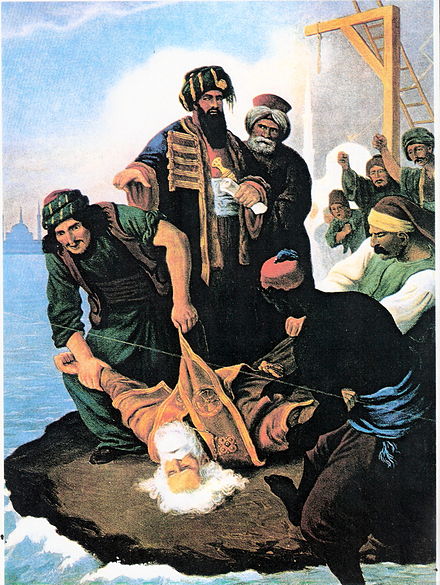Ελληνικό πογκρόμ το 21;
Δημοσιεύτηκε: 20 Φεβ 2024, 10:59
Η συνέντευξη που έδωσε ο Πούτιν στον Κάρλσον ήταν πολύ λιγότερο ενδιαφέρουσα από την επόμενη στο ρώσο δημοσιογράφο Ζαρούμπιν.
http://en.kremlin.ru/events/president/news/73457
Σε κάποιο σημείο, που μιλά για την χαπατοπροπαγάνδα σε σχέση με τα πογκρόμ κατά των Εβραίων στη Ρωσία λέει τα εξής.

http://en.kremlin.ru/events/president/news/73457
Σε κάποιο σημείο, που μιλά για την χαπατοπροπαγάνδα σε σχέση με τα πογκρόμ κατά των Εβραίων στη Ρωσία λέει τα εξής.
Ομολογώ ότι πρώτη φορά το ακούω. Ξέρω ότι το πτώμα του Γργορίου του Ε το αγόρασαν 3 εβραίοι και το περιέφεραν στην Κωνσταντινούπολή (και υπάρχει διάσημος πίνακας) αλλά δεν ήξερα ότι αυτό οδήγησε σε αντίποινα. Ισχύει;During the taped part of the interview, we should have discussed efforts to use inter-ethnic relations and the Jewish pogroms in the Russian Empire as a way of denigrating and demonising Russia. One of the subjects we discussed when the cameras were turned off was what US Secretary of State, Mr Blinken, mentioned on several occasions. He said that his relatives, his great-grandfather, fled the Jewish pogroms and left Russia.
This topic keeps surfacing across the world, in Europe and in the United States. Let me reiterate that it is being used to demonise and discredit Russia and to demonstrate that it is home to barbaric, cruel people and outlaws. However, we can clarify many issues if we try to understand what today’s US Secretary of State actually said and if we look beyond political slogans by focusing on the substance.
All this information is in our archives. For example, Mr Blinken’s great-grandfather did leave the Russian Empire. I think that he was born somewhere in the Poltava Province, and then moved to Kiev before emigrating. This raises the following question: does Mr Blinken think that Kiev and the surrounding territories are historically Russian land? This is my first point here.
Second, if he says that his great-grandfather left Russia to escape the Jewish pogroms, this, at least, means, and I would like to stress this point, that in 1904, since this is when Mr Blinken’s great-grandfather left Kiev for the United States, Ukraine did not exist – this is what he seems to believe. This way, Mr Blinken seems to share our views. That said, he should have refrained from saying so in public. This could undermine his cause.
Pavel Zarubin: Just the other day, there were articles in the German media saying that the grandfather of Germany’s current Foreign Minister Annalena Baerbock was a devoted Nazi. Considering the way the relations between our countries have been unfolding over the past years, could it be that the Nazi virus still exists in this country at a genetic level or something like that?
Vladimir Putin: This is an iteration of nationalism, albeit a radical one. By the way, something has just occurred to me about these pogroms. They took place mainly in the south and southwest of the Russian Empire. In fact, this is where present-day Ukraine is, for example in Kiev, in 1905. If Mr Blinken’s ancestor left in 1904, the first pogrom in Kiev, I mean a big one, happened in 1905, which means that his great-grandfather, or his great-great-grandfather, could only find out what happened there from newspapers, or from those who were in Kiev at that time.
In fact, these tragic mass atrocities started in the early 19th century. I think it was in 1820 or in 1821 when the first major pogrom took place. We know that these crimes took place in Odessa, and later in Melitopol, in Zhitomir, and in other cities of present-day Ukraine, as well as in Byelorussia. There were also several incidents of this kind in Siberia, but the very first one happened after a Greek Patriarch was killed in Constantinople. This was when the Greeks who lived there thought that the Jews were involved in the assassination in one way or another.
